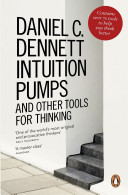
Books, Brochures, and Chapters>Book: Dennett, Daniel C (2013-05-06), Intuition Pumps and Other Tools for Thinking, Penguin UK, Retrieved on 2013-10-22Source Material [books.google.com]
Folksonomies: science Memes
22 OCT 2013
 How to Compose a Successful Critical Commentary
How to Compose a Successful Critical Commentary
How to compose a successful critical commentary:
1. Attempt to re-express your target's position so clearly, vividly and fairly that your target says: "Thanks, I wish I'd thought of putting it that way."
2. List any points of agreement (especially if they are not matters of general or widespread agreement).
3. Mention anything you have learned from your target.
4. Only then are you permitted to say so much as a word of rebuttal or criticism.A great list of criteria. Use this before composing any response in online debate.
24 OCT 2013
 Make Mistakes
Make Mistakes
For evolution, which knows nothing, the steps into novelty are blindly taken by mutations, which are random copying “errors” in DNA. Most of these typographical errors are of no consequence, since nothing reads them! They are as inconsequential as the rough drafts you didn’t, or don’t, hand in to the teacher for grading. The DNA of a species is rather like a recipe for building a new body, and most of the DNA is never actually consulted in the building process. (It is often called “...Evolution makes them all the time, and look what it has produced. Appreciate your mistakes, view them as works of art.
24 OCT 2013
 Card Trick Involving Chance
Card Trick Involving Chance
A good card magician knows many tricks that depend on luck—they don’t always work, or even often work. There are some effects—they can hardly be called tricks—that might work only once in a thousand times! Here is what you do: You start by telling the audience you are going to perform a trick, and without telling them what trick you are doing, you go for the one-in-a-thousand effect. It almost never works, of course, so you glide seamlessly into a second try—for an effect that works...The idea is to rely on probability, have several tricks where the odds get better and better until p=1.
28 OCT 2013
 Using Lay Audiences to Force Explanation
Using Lay Audiences to Force Explanation
In many fields—not just philosophy—there are controversies that seem never-ending and partly artifactual: people are talking past one another and not making the necessary effort to communicate effectively. Tempers flare, and disrespect and derision start creeping in. People on the sidelines take sides, even when they don’t fully understand the issues.
It can get ugly, and it can have a very straightforward cause. When experts talk to experts, whether they are in the same discipline or ...Often when experts debate, they fall into the trap of assuming one another's expertise and fail to explain basic concepts, with the result that they beging talking past one anothers. An inventive solution to this is to have a group of non-experts be the audience and have the debaters address them instead.




